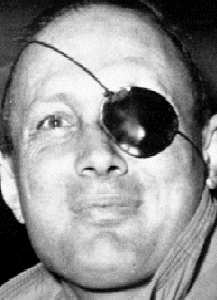

Defense Minister Moshe Dayan
1915-1981
"Along the Syria border there were no farms and no refugee camps -- there was only the Syrian army... the kibbutzim saw the good agricultural land... and they dreamed about it... They didn't even try to hide their greed for the land... We would send a tractor to plow some area where it wasn't possible to do anything, in the demilitarized area, and knew in advance that the Syrians would start to shoot. If they didn't shoot, we would tell the tractor to advance further, until in the end the Syrians would get annoyed and shoot. And then we would use artillery and later the air force also, and that's how it was." 1976
Already a battle hardened by the end of his teens, Moshe Dayan gained
his trademark eyepatch while fighting the Vichy French in Syria during
WWII after a bullet struck his binoculars. Dayan's activities in the 1948 War of Independence began when he commanded the defense of
Jewish settlements in the
Jordan Valley. He later commanded the battalion that attacked the city
of Lydda and helped halt Egyptian forces on the
southern front. In August 1948, he was appointed commander on the Jerusalem front. In 1949, he participated in armistice
talks with Jordanian officials at Rhodes. Dayan's military prowess
allowed him to rise to the rank of chief of operations at
General Headquarters in 1952, and, in 1953, he was elected Chief of
Staff of the armed forces3.
Dayan became Chief of Staff during a time of severe Arab belligerence. Despite the military armistice of 1949, the surrounding Arab nations remained hostile, using maritime blockades, reinforcing an economic boycott, promoting political and propaganda warfare and supporting terrorism in Israel. Dayan insisted on strong retaliation operations. His view was that the Arabs saw terrorism as a stage of war, and the longer the terrorist attacks continued, the longer the Arabs had to build up their military strength. He wanted to force the Arabs into open battle before they gained full military power3. In 1957, Dayan led the Israeli Defense Forces in the Suez Canal incident.
In 1958, Dayan left the military for politics and became a member of the Israeli Knesset in 1959. In 1964, Dayan resigned as Minister of Agriculture after an argument with then Prime Minister Levi Eshkol. Dayan returned to Eshkol's cabinet as Defense Minister in the days before the Six Day War and crafted Israel's war strategy along with Israeli Commander Yitzhak Rabin. His popularity soared after the Israeli victories.
Dayan's popularity waned significantly after the 1973 Yom Kippur war in which Israel was caught completely by surprise. Blame fell largely on Dayan as Defense Minister and he resigned his post in 1974. In a surprising turnaround from his hawkish past, Dayan was a lead negotiator with Egypt during the Camp David Accords. Dayan died in 1981 after a two year battle with cancer.
Dayan became Chief of Staff during a time of severe Arab belligerence. Despite the military armistice of 1949, the surrounding Arab nations remained hostile, using maritime blockades, reinforcing an economic boycott, promoting political and propaganda warfare and supporting terrorism in Israel. Dayan insisted on strong retaliation operations. His view was that the Arabs saw terrorism as a stage of war, and the longer the terrorist attacks continued, the longer the Arabs had to build up their military strength. He wanted to force the Arabs into open battle before they gained full military power3. In 1957, Dayan led the Israeli Defense Forces in the Suez Canal incident.
In 1958, Dayan left the military for politics and became a member of the Israeli Knesset in 1959. In 1964, Dayan resigned as Minister of Agriculture after an argument with then Prime Minister Levi Eshkol. Dayan returned to Eshkol's cabinet as Defense Minister in the days before the Six Day War and crafted Israel's war strategy along with Israeli Commander Yitzhak Rabin. His popularity soared after the Israeli victories.
Dayan's popularity waned significantly after the 1973 Yom Kippur war in which Israel was caught completely by surprise. Blame fell largely on Dayan as Defense Minister and he resigned his post in 1974. In a surprising turnaround from his hawkish past, Dayan was a lead negotiator with Egypt during the Camp David Accords. Dayan died in 1981 after a two year battle with cancer.